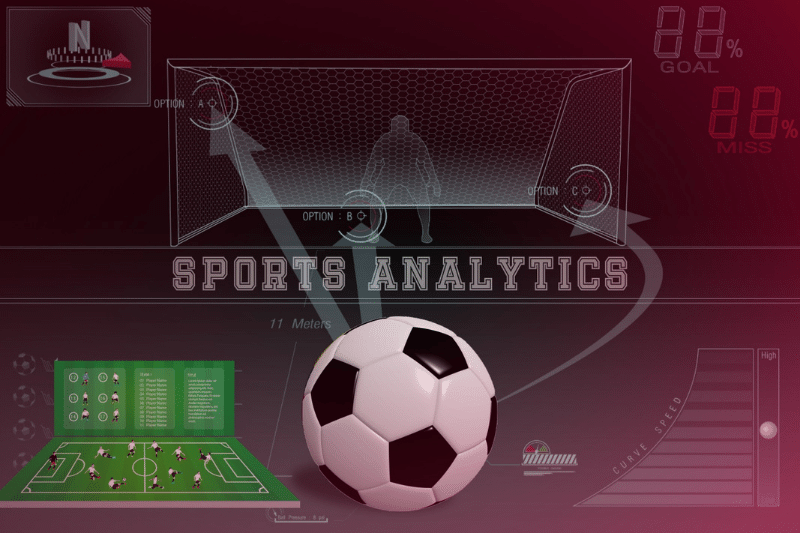
Due to numerous technological breakthroughs, the amount of data available in today's globe appears to be inconceivable. Sports teams can take advantage of the data that is readily available. Sports analysis is used in the sports sector to boost revenue, improve performance of the athletes and team quality of play, prevent accidents, and many other things.
Many clubs are creating entire departments only to analyze the future of sports analytics in an attempt to become the greatest programme in the league, so sports analysts are in high demand. These analysts can take data and turn it into simple yet insightful visuals that can be shared with other team members. Trainers, managers, agents, recruiters, marketing professionals, health workers, and the analytics team all benefit from the information.
Several clubs and leagues are starting to use wearable technology to help with injury prevention and player performance. Increasing technological resources are prompting more leagues to examine the best analytics resources in order to gain the competitive lead that clubs want.
Another component of sports data analytics is the use of data to boost income and improve the fan experience. It is the role of the sports analyst to communicate the numbers and changes from past seasons when ticket sales and attendance are down from previous seasons. Sports analysts can utilise these metrics to analyse other types of data to figure out what's causing the problem, and then pass the knowledge on to sports marketers or other professionals involved in ticket sales and fan experience.
The 2002 Oakland Athletics were the first and most popular team to embrace analytics in the contemporary era. The account of how t he A's and general manager Billy Beane employed "sabermetrics" to transform the way the team acquired talent under tight financial restraints is told in Michael Lewis' 2003 book "Moneyball." Sabermetrics is "the pursuit for objective knowledge about baseball," according to the Society for American Baseball study. Bill James, an American baseball writer, coined the term in 1980, but since then, scholars have attempted to develop the statistical analysis process in order to challenge the established methods of evaluating players.
he A's and general manager Billy Beane employed "sabermetrics" to transform the way the team acquired talent under tight financial restraints is told in Michael Lewis' 2003 book "Moneyball." Sabermetrics is "the pursuit for objective knowledge about baseball," according to the Society for American Baseball study. Bill James, an American baseball writer, coined the term in 1980, but since then, scholars have attempted to develop the statistical analysis process in order to challenge the established methods of evaluating players.
Baseball appears to be the sport that is most ahead of the pack when it comes to the numbers game, owing to the game's heavy reliance on statistics. However, there has been a recent movement in the National Basketball Association (NBA), with the Houston Rockets leading the assault.
Daryl Morey was hired as the Rockets' general manager in 2007, despite never having played or coached in the NBA. Since then, Morey has established himself as a basketball analytics pioneer. He graduated from Northwestern University with a bachelor's degree in computer science and an MBA from M.I.T., but none of that mattered in the athletics world until he came in. Morey's idea is that because a three-pointer is worth more than a typical two-point basket, shooting threes rather than other jump shots is more efficient. In other words, the more three-pointers a team makes, the more points they will score.
 If you look at the Rockets' statistics from this season, you'll notice that roughly half of their shots come from a three-point range. They've topped the league in three-pointers for the past four seasons, by a large margin. This is all part of Morey's plan to play the numbers game in Houston's favour. While his club isn't the most skilled in the league, Morey has used a moneyball-style approach to close the talent gap.
If you look at the Rockets' statistics from this season, you'll notice that roughly half of their shots come from a three-point range. They've topped the league in three-pointers for the past four seasons, by a large margin. This is all part of Morey's plan to play the numbers game in Houston's favour. While his club isn't the most skilled in the league, Morey has used a moneyball-style approach to close the talent gap.
Analytics has engulfed not only professional front offices but also fans, who are devouring more information and numbers on a daily basis. There are numerous reports, analyses, and even websites dedicated to providing supporters with a more in-depth look at their team's specific data. In some circumstances, analytics has been welcomed with wide arms, while in others, it has been treated with harsh criticism: The reactions vary based on who is in charge of the team
Despite his scathing criticism, there are some who feel the same way about all major sports. For a long time, some felt that player evaluation in all leagues was unfair, because there is more to a player than his height, build, speed, and strength. The ongoing progress of big data in sports analytics can be linked to a better manner of evaluating players. However, sports are an imperfect science, therefore this is an issue.
The fault in analytics is that it considers a player to be nothing more than a collection of numbers, rather than the wide range of human elements that have a significant impact on the game. All of these factors could be part of the next analytical breakthrough, but for now, everyone is focused on figuring it out and reaching the summit.
The Data Sports Group is a sports data analytics company with an excellent content library that provides data and statistics from over 5000+ contests across 50 sports. With this platform, you can add sports material to your product or service in an infinite number of ways.










